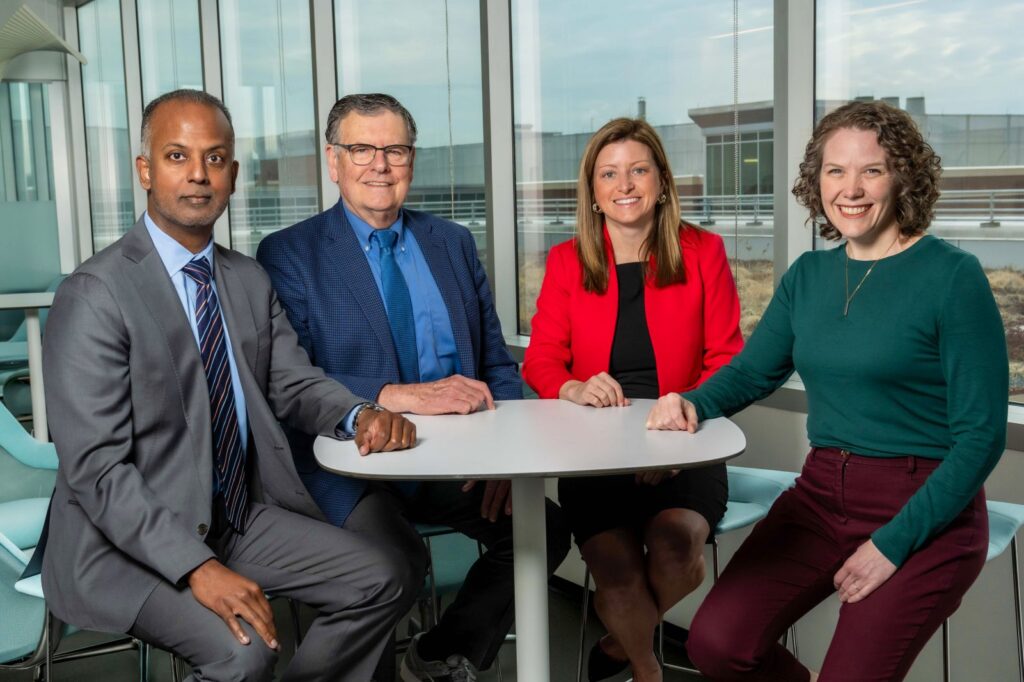Virginia Tech News
By Diane Deffenbaugh
10 Feb 2025
Virginia Tech will play a central role in an ambitious statewide initiative to leverage strengths and partnerships across three regions in order to accelerate biotechnology innovation and advance the commonwealth’s position as a life sciences leader.
GO Virginia has approved $14.3 million to support Project VITAL: Virginia Innovations and Technology Advancements in Life Sciences, which will establish new research cores, expand workforce development programs, and create a collaborative network connecting Virginia Tech and other academic institutions with industry partners across the commonwealth’s biotechnology corridor.
This initiative builds upon Gov. Glenn Youngkin’s broader $90 million investment in biotechnology advancement, which included $27 million for the Fralin Biomedical Research Institute at VTC to expand clinical research.
The Roanoke Blacksburg Innovation Alliance (RBIA), an organization focused on growing the region’s technology and biotechnology sectors, will collaborate with Virginia Tech and Carilion Clinic to lead the Region 2 effort. Project VITAL will direct $4.9 million to strengthen the region’s position at the forefront of fields such as medical devices, oncology therapeutic research, and neurotechnology.
The funding will lend crucial enhancements to strengthen the innovation corridor in Southwest Virginia, including through a proof-of-concept program and support for innovation fellowships facilitated through LAUNCH: Center for New Ventures at Virginia Tech, both of which are specifically designed to encourage biomedical startups out of the university.
“At Virginia Tech, enterprising faculty and students are making discoveries and developing technology that offer foundations for the nation’s next great companies,” said Brandy Salmon, associate vice president for innovation and partnerships. “This program offers what is needed to ensure that the innovations in the university’s labs are moved into the commercial sector for human and economic impact.”
Virginia Western Community College, the Roanoke Blacksburg Technology Council, and the Blue Ridge Partnership Health Science Careers will work to boost the biotechnology talent pipeline in the region. GO Virginia Region 2 includes the cities of Covington, Lynchburg, Radford, Roanoke, and Salem and the counties of Alleghany, Amherst, Appomattox, Bedford, Botetourt, Campbell, Craig, Floyd, Franklin, Giles, Montgomery, Pulaski, and Roanoke.
Virginia Commonwealth University and Activation Capital will lead similar efforts in Region 4 around Richmond/Petersburg, and the University of Virginia and CvilleBioHub will lead Region 9 in Charlottesville.
Project VITAL aims to create 1,315 jobs over five years and lead to a total economic impact of $40.8 million.
“The collaboration between the regions exemplifies the power of partnership in driving job creation and fostering innovation,” said William E. Amos, chairman of GO Virginia Region 2. “This award is a testament to public-private partnerships’ impact on our communities, the region, and the Commonwealth of Virginia.”
Erin Burcham, president of the Roanoke Blacksburg Innovation Alliance, said the region is hyperfocused on building out the foundation for biotech to flourish. “This investment represents a pivotal moment for Virginia’s biotechnology ecosystem,” she said. “Project VITAL will provide emerging companies in this region with access to advanced laboratory facilities, shared equipment, and specialized programming designed to support their growth and success. Funds will support talent recruitment, capital attraction, new startup programming, branding for the sector, and operations to maximize Virginia’s economic potential in biosciences.”
Carilion Clinic Innovation Director Aileen Helsel said Carilion’s innovation and human factors teams are excited to be partners in broadening the region’s biotech sector. “Carilion will transform GO Virginia’s support into building resources that guide medical device startups as they navigate federal regulations with the help of streamlined documentation and risk management and device testing and validation, making it possible to move the devices closer to helping us care for our patients,” Helsel said.
Michael Friedlander, vice president for health sciences and technology at Virginia Tech and executive director of the Fralin Biomedical Research Institute at VTC, emphasized the initiative’s significance for advancing biomedical innovation.
“It has been very gratifying to see the substantial growth and cooperation between diverse organizations that have occurred in GO Virginia Region 2 over the last decade in the life and health sciences innovation and commercialization sectors,” Friedlander said. “The region has come a long way, and is now well positioned to become a true destination for talent and investment with all the necessary elements in place. From a globally recognized scientific-discovery base to a thriving health care enterprise and a committed innovation and business network, working together with local and state government and organizations such as RBIA to convene the stakeholders, Project VITAL will leverage all the elements of the biotechnology ecosystem to make the whole so much greater than the sum of its parts.”
John Provo is the executive director of Virginia Tech’s Center for Economic and Community Engagement, part of Outreach and International Affairs that serves as GO Virginia Region 2’s support organization.
“Project VITAL exemplifies our mission of connecting university expertise with community needs,” he said. “By bridging the gap between Virginia Tech’s research capabilities and regional economic development, we’re creating pathways for innovation that generate high-wage jobs while addressing critical health care challenges. This initiative demonstrates how strategic partnerships can transform scientific discoveries into tangible economic opportunities for Virginia.”
https://news.vt.edu/articles/2025/02/outreach-gova-project-vital.html
